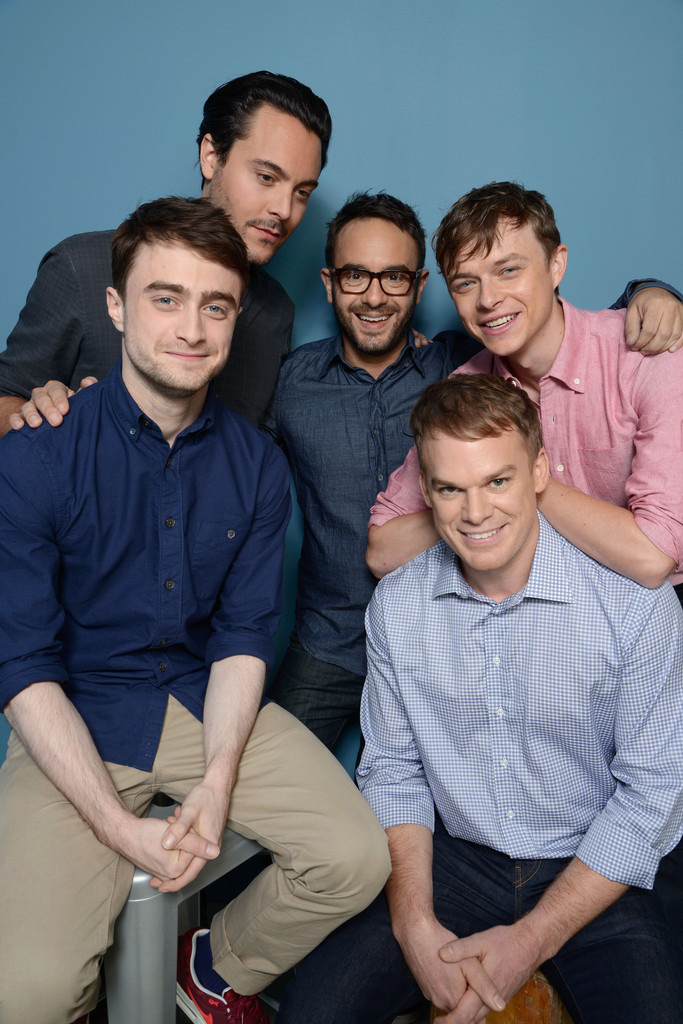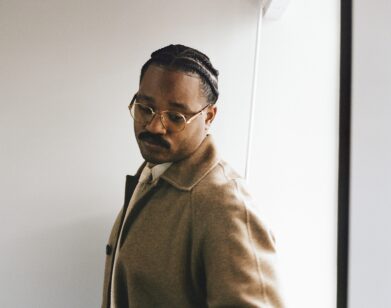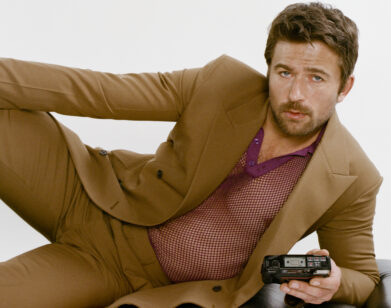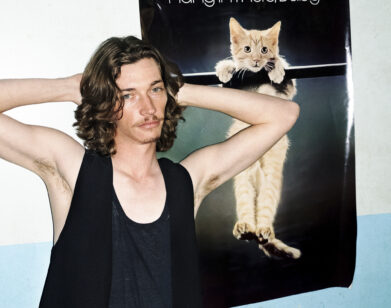John Krokidas’ Darling Debut

ABOVE: (FRONT LEFT TO RIGHT) DANIEL RADCLIFFE, JACK HUSTON, JOHN KROKIDAS, DANE DEHAAN, AND MICHAEL C. HALL AT THE TORONTO FILM FESTIVAL.
It is John Krokidas’ birthday, and he is a happy man. Sitting on a sofa in the Waldorf hotel, the director and writer is doing press for his first film, Beat biopic Kill Your Darlings, “This movie, as you might have heard, took 10 years to get made,” he tells us. “I was at my premiere of my movie last night in New York City, the town in which I grew up and went to school. This is the best birthday ever!”
Nominated for the Grand Jury Prize at Sundance, Kill Your Darlings centers around Allen Ginsberg’s career at Columbia University and his friendship with fellow student Lucien Carr. Played by Dane DeHaan as smart, slight, and toxically charismatic, Carr introduces Ginsberg to Jack Kerouac and William S. Burroughs and encourages him to write. “Lucien knows that he’s really good at making people fall in love with him,” explains DeHaan. “He knows to use it as a game of cat-and-mouse, where people are walking on the edge of feeling like they’re really loved, but feeling like they want more. He never gives them what they want and that’s what keeps them coming back.” Carr, however, comes with a dark shadow: an old lover (or, depending on your opinion, stalker) named David Kammerer.
Joining DeHaan in the cast are Daniel Radcliffe as Ginsberg, Jack Huston as Kerouac, Ben Foster as Burroughs, Elizabeth Olsen as Edie Parker, and Michael C. Hall as Kammerer.
EMMA BROWN: How did you first come across the project 10 years ago?
JOHN KROKIDAS: My best friend, my college roommate Austin Bunn, was starting to get known as a short story writer and a playwright. He came to me with the most amazing idea for a play. He and I idolized the Beats, like a lot of us did in college. I had never heard this story before; this unknown story of murder that caused the Beats to stop just being college students like we all were—talking about what they were going to do with our lives and wanting to do something important—and actually [start] writing and their revolution. While he’s pitching the play version of this to me, I, of course, am seeing flashes of the movie version in the back of my head and decided I needed to convince him that this would make a horrible play, but it would make a fantastic movie and we needed to write it together.
BROWN: Dane is really breaking out this year. How did you discover and cast him?
KROKIDAS: My boyfriend, believe it or not, from the beginning told me, “You are going to cast Dane Dehaan in this role.” My boyfriend was an In Treatment fan and had seen his work there. We did old-fashioned Hollywood chemistry reads with Daniel Radcliffe. Dane was the first one to walk in, and he blew us away. Dan and I, when we saw him start reading the scene that we had been practicing, it was like seeing the character that you had been writing in your head come to life. You’re told as a director, “Never offer a role to an actor in the room. Go home, think about it, make sure this is what you want to do.” We just wanted to give it to him, but I held us back, and I said, “So, Dane”— this is a question you ask actors if you like them—”so what’s your life like the next couple of months?” And he pulled a total bold move: he crossed his arms, leaned up against the wall, and said, “I don’t know, you tell me.” That cockiness—you’ve seen the movie—it’s part of his character. He just nailed it. Since that day, Dan, Dane, and I have become not just coworkers, but incredible friends and collaborators. The cool thing with this being my first movie is those two have had so much experience. While we were rehearsing and practicing for the movie, [it] gave me the time to also go to them: “Okay you guys, nobody else is listening. I’m about to direct my first movie. What the hell am I supposed to be doing?” And they gave me advice and told me what they thought made a great director because they had worked with so many, and really kind of gave me boot camp director training in the couple of weeks before we started filming. New Year’s last year, my boyfriend was away from me for school reasons, and the two of them took me out to celebrate and we ended up celebrating New Year’s together and playing dorky card games in Daniel Radcliffe’s apartment until five in the morning. Even now, doing press with you and releasing the movie, they’ve been there beside me not just as coworkers but again as friends, just explaining what’s about to happen to me, and helping me through the process. It’s been a really special relationship and I feel incredibly lucky to have gotten those two in my movie. I’m proud of the work they’ve done.
BROWN: What was the best advice that they gave you?
KROKIDAS: Dan told me to learn the name of every member of the crew because these people are working for not a lot of money and giving you all of their time and their hard work. Making sure that everybody that is working for you, no matter what their position is, knows that they’re part of the team is one of the most important things that you can do. Because they will have your back when things go wrong and they did. Dane taught me that ultimately, you will have mishaps during production and the most important thing a director can do, even if it’s the wrong decision, is to make a decision because you need to keep leading the team forward. Even if you have to divert it to the side for the second in order to come up with an answer, it’s that confidence and that ability to make a choice that is going to keep everybody moving forward and not immersed in whatever the production problem or issue is.
BROWN: I know that you almost made the film several times, and that Dan was in the first-ever incarnation of the cast. How did you decide on Dan for the role of Allen Ginsberg?
KROKIDAS: I made a list of all the young actors whose work I admired and wanted to work with and also, let’s just be honest, I’m casting Allen Ginsberg here—I needed somebody who was bright enough and empathetic enough that you would believe that he would become the poet that he would later become. When I wrote Daniel Radcliffe’s name down, I thought of the arc and the role of Allen in the movie: how he went from being someone who was a dutiful son who’s only really shown the world a certain part of himself. I hadn’t met Dan yet, but I thought he might be able to relate to that. So I sent the script to his agent and it was one of those lucky things where the agent loved the script and then Dan loved the script and the next thing I knew, I was sitting down and having coffee with him while he was doing Equus. What they don’t teach you in film school is, director-actor meetings, it’s like a first date: you know within five minutes whether or not there’s chemistry there and whether or not you work on the same operating systems. Dan is just such a smart, charming, good-natured person who deals with his own personal issues and all the craziness that comes with it by turning it into humorous fodder for his friends and the world. I kind of do a similar thing. We ended up gossiping for hours and sharing all of these intimate secrets about ourselves on our first date. Then he offered to audition for me and we did some scenes from the script and some improvs together, and it was just one of those moments. I don’t think of actors when I write, but I have a general idea of what the [character’s] personality traits are and what they might be like—and I saw it coming to life right in front of me. I thought to myself, here is an actor who I not only really like as a person but who’s killing it and is creatively giving me what I need. It’s at that point that I knew I needed to fight for him and I wanted him in the role.
Dan has been beside this project for four and half years, helping me fight to make it and get this done. The coolest thing he said to me before we started shooting was that he wanted to approach this like this was his first film, too, and to throw out all the ways he’d been acting before. I had studied acting at Yale when I was an undergraduate. I was a horrible actor myself—I realized this after being cast as Knave Number Five one too many times. [laughs] We played and I taught him different techniques and he really loved Meisner, so it was like both of us were both discovering—not too dissimilar from the characters—new ways of expressing ourselves and we got to build that relationship together. I don’t think that happens too often between an actor and director, and I realize how special that is now.
BROWN: Did you originally want to be an actor?
KROKIDAS: When I was in high school. I went to Yale in order to study theater studies and to be an actor. This is what I feel like everyone can relate to in this movie: It’s about going to college, not sure what you want to be. Allen Ginsberg wanted to be a labor lawyer when he first started Columbia University. Then meeting a bunch of friends and trying out different things, and finding the group that you belong in and ultimately finding your own voice and realizing who you wanted to be. For me, I wanted to be an actor at first but I was still somewhat closeted in high school and then in college, and I wasn’t ready to show my real emotions yet, and so, because of that, I wasn’t really that successful as an actor. But the cool thing was, having trained as an actor, once I started playing around with the camera, it was very easy for me to empathize with my friends and make sure that they always felt comfortable in front of the camera. My whole philosophy of directing and art in general is I work best when I know I’m surrounded by people who believe in me.
BROWN: Do you think that one person is being exploited by the other in the relationship between David Kammerer and Lucien Carr?
KROKIDAS: I’ve seen this relationship played out amongst certain gay friends of mine so many times—obviously not involving murder. I’ve seen friends of mine that are older fall in love with somebody who is younger who is still kind of unsure of their sexuality. The sexuality of the younger man is actually irrelevant. I’ve seen the younger man ultimately go on and get married and have kids and this would just be one moment in their lives and I’ve seen other times where it’s the formative relationship in which they discover that they’re gay. But what usually happens is that this older man falls in love with this younger man and the younger man falls in love with the older man because they’re so confident, and because of their charm and life experience and the cliché is that the younger man didn’t have a strong father figure and finally finds one. Where these relationships get interesting and difficult is, there comes a point in the relationship where the only way to get more intimate with each other is to become sexual and, once the relationship becomes sexual, then the power position actually switches from the older man to the younger man. The younger man realizes now that the older man is desirous of them, and that they have the control [over] whether or not the sexual aspect of the relationship continues. I’ve seen these relationships both fail and succeed in real life depending on the couple. With Lucien Carr and David Kammerer—let’s be honest, David Kammerer was his Boy Scout troop leader. This relationship was somewhat salacious from the start. However, having said that, one of the things Austin and I discovered doing research is that, David Kammerer’s friend said that David tried to leave the relationship several times and that Lucien kept chasing after him. So I just feel like the two of them were in a really toxic, co-dependant relationship and everyone around them knew this and knew it was going to end badly, but no one expected it was going to end in murder.
KILL YOUR DARLINGS COMES OUT TOMORROW, OCTOBER 16, IN NEW YORK AND LOS ANGELES.






